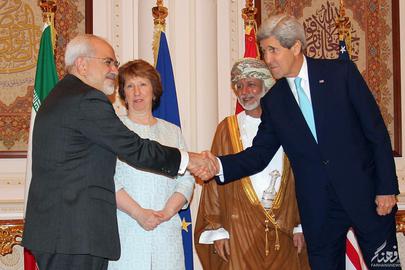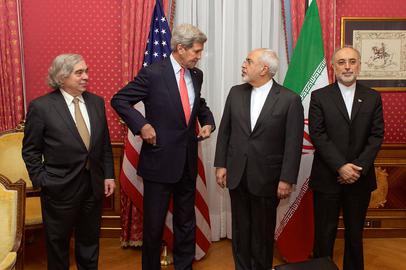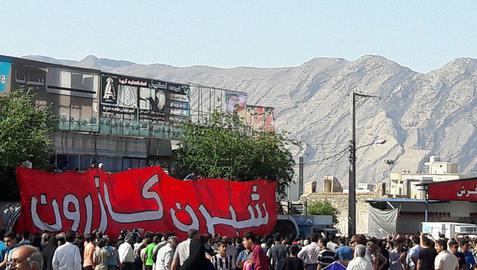Recently published memoirs by Ali Akbar Salehi, currently the head of Iran’s Atomic Energy Organization, tell the story of one of Iran’s most prominent diplomats, from his childhood in Iraq to holding key positions in the government, playing a significant role in nuclear negotiations, and forming unique relationships with some of Iran’s most influential figures.
Throughout his career Salehi has taken on a number of high-profile roles within the Islamic Republic, including serving as Iran’s representative to the International Atomic Energy Agency, Minister of Foreign Affairs under President Mahmoud Ahmadinejad from January 2011 to August 2013 and two terms as vice president of Iran and the head of the Atomic Energy Organization under President Hassan Rouhani.
The 650-page memoir begins with Salehi’s childhood in the Shia holy city of Karbala in Iraq, where he was born in 1949. His father, a successful merchant in Iraq, was born in Qazvin, Iran, but Salehi writes that most of his ancestors were born in Iraq, including his grandfather, who owned a large house in Karbala, which he says was 200 years old. The house no longer exists, a result of the expansion of the shrine of Imam Hossein, the Third Shia Imam. Many years ago, Saddam Hussein expelled Salehi’s family, including his grandfather, from Iraq. “They confiscated our house and our books,” he writes.
Salehi learned Arabic while playing with other children in the alleyways of Karbala, while Persian was the language his family spoke at home. “At that time in some [Iraqi] cities Persian was popular,” Salehi says. “Everybody spoke Persian when we went to the grocery store or the butcher or anywhere else.” But he still uses the Arabic words for “ma” and “pa” when talking about his parents.
On July 14, 1958, when the family was on a visit to Iran, General Abd al-Karim Qasim overthrew King Faisal II of Iraq. “My father said that Iraq is done and we will never return,” Salehi remembers.
His memoirs describe how, as a child, Salehi was fond of Iraq and found it to be more advanced than Iran. And during his time as foreign minister, he gave friendly advice to Iraqi officials with a view to improving the situation in the country of his birth. He wanted to waive visa requirements for traveling between Iran and Iraq, but Islamic Republic authorities did not agree out of the fear that such practice could be “abused.” He states that in order to sustain strong relations with Iraq it is necessary to set up, as soon as possible, expressways and high-speed railway links between Tehran and the two Iraqi cities of Baghdad and Karbala.
Schoolboy Years and the “Salehi Formula”
As a young schoolboy, Salehi studied at an Iranian school. He writes that he was not very studious and failed his exams in his first year at primary school.
The day that his book was released, Salehi said that as a child he peddled cigarettes so he could earn pocket money — but soon after this comment, the foreign ministry, which published the book, told him he must not use the word “cigarettes” and should instead replace it with “stuff.” He also describes in the book how he sold “goods” outside his father’s shop but that sometimes his father’s friends cheated him and would not pay.
Following the 1958 coup d’état in Iraq and his father’s decision to stay in Iran, Salehi was sent to school in Tehran. However, he was discouraged by the threadbare and low-level educational standards when compared to the better schools in Iraq. And the other schoolboys’ treatment of him did not make life any better for him. He says that because of his accent, they called him “Ajam,” a racial pejorative and derogatory Arabic word for those whose speech cannot be understood, while in Iran he was called “Arab,” — not meant as a term of endearment.
So he pushed his father to send him to Damascus. Once there, he found the Syrian capital more depressing than Tehran and so decided to return to Iran. His father, however, convinced him to go to Beirut instead. He studied for his high school diploma in the Lebanese capital and continued his studies in that city until receiving his Master’s degree in physics from the American University of Beirut in 1971. The lively environment of Beirut and at the American University instilled in him an intense interest in continuing his education in the United States.
Salehi’s family agreed to send Salehi to Boston to study at the Massachusetts Institute of Technology (MIT), also the alma mater of Ernest Moniz, later his US counterpart as Secretary of Energy under President Obama. In 1977, Salehi received a PhD in nuclear engineering from MIT. “I wrote my thesis with the financial support of the US Department of Energy,” he writes. “It was a rather good dissertation. Happily, later my dissertation became a small part of a book authored by my professor. This professor was so sublime that he put my name on the formula [that I had come up with]. In his book, he wrote that to do such and such a thing, use the ‘Salehi formula.’”
Salehi’s dissertation, “Resonance Region Neutronics of Unit Cells in Fast and Thermal Reactors,” was about managing nuclear fuel, a subject that years later turned into a serious point of contention between Iran and the US. To solve it, the two MIT graduates, Salehi and Moniz, had to sit down together and negotiate in Switzerland and Austria.
Secret Nuclear Negotiations in Oman
In January 2011, President Mahmoud Ahmadinejad chose Ali Akbar Salehi as his Minister of Foreign Affairs. As the foreign minister, Salehi became the Iranian architect of negotiations with the United States in Oman. The suggestion came from the American government and was conveyed by Omani officials while Saeed Jalili, the then-Secretary of Iran’s Supreme National Council, was conducting futile nuclear negotiations with the 5+1 group of countries — the five permanent members of the UN Security Council plus Germany.
Salehi says that at first he did not take the suggestion very seriously, so he sent a message to the Omani intermediaries that Iran would agree to negotiations only if the US agreed that Iran had the right to enrich uranium and the US consented to lifting the sanctions. In return, Iran would stop enriching uranium beyond five percent. The Americans agreed.
Sultan Qaboos of Oman conveyed the message that President Obama had agreed to Iranian conditions to the Supreme Leader Ayatollah Khamenei. Salehi then called Ali Asghar Hejazi, who was in charge of security affairs at Khamenei’s office, and asked him to whom the letter should be given. “He told me to give the letter to Dr. [Ali Akbar] Velayati [Khamenei’s advisor in international affairs]. I did that...sometime later I visited the Supreme Leader. Also present at the meeting were Mr. Mohammadi Golpayegani [Khamenei’s chief of staff] and Mr. Hejazi. I put the question this way: ‘We have been negotiating with the 5+1 group for a long time but we have got nowhere because arriving at a consensus among six countries is very difficult...now, with the good offices of Sultan Qaboos, permit me to follow the second path — meaning direct negotiations with the Americans.”
Talk, But No Concessions
According to Salehi, at first Ayatollah Khamenei said he believed it was not clear what good could come out of these negotiations. Instead, he apparently told Salehi, “but it can do a lot of harm because, for example, public opinion would say that Iranians yielded to talk to the Americans.” However, Salehi pressed on. “’Sir,’ I said, ‘let us try it even if it is [delivered] as our last word...He said: ‘if it is delivered as the last word then it is all right and I would not oppose it, but there is a condition.’” Khamenei’s condition was that the Americans be prevented from taking advantage of the negotiations to get concessions from Iran “because it would damage Islamic Republic’s reputation.”
Salehi said Khamenei’s agreement made him “very happy.” But the response from Ahmadinejad is not what he expected. “Immediately I went to Dr. Ahmadinejad. I thought this would make him happy as well but, contrary to my expectations, he did not show any enthusiasm for it. ‘Mr. Salehi,’ he said, “this is a dangerous thing and you might fail badly.’” Salehi’s reply was: “At most we will fail. We are not doing anything bad. The worst that they can say is that [I] tried something politically but I did not succeed’...In any case he did not show the support that I expected, meaning that he did not encourage us, but did not stand in our way either. Of course, later on he supported me in many cases.”
According to Salehi, after Ahmadinejad received “a series a negative reports about our work he wrote on the reports ‘not true’ in his own handwriting. I mean that he fairly and justly came to my help and I really owe him thanks. But there are things about why he recused himself [from talks in Oman] that I cannot talk about.”
Negotiations under Rouhani
Salehi writes that after the victory of Hassan Rouhani in the 2013 presidential election, he asked his deputies at the foreign ministry to inform Rouhani’s people about the secret negotiations in Oman. A few days before the inauguration he himself brought the documents about the negotiations to the president-elect and Khamenei’s representative at the Supreme National Security Council. Rouhani found it difficult to believe, according to Salehi.
He says Rouhani offered him one of three positions: his chief of staff, minister of science and the head of the Atomic Energy Organization. Salehi accepted the third — but Rouhani expressed no interest in him being involved in the nuclear negotiations. “From the beginning...they did not want me to directly participate in the negotiations,” he writes. “Of course, the technical part was the responsibility of the Atomic Energy Organization and in this area we helped our negotiators, but I did not directly participate in the negotiations.”
Then things changed, and the Rouhani administration needed him. “It was around mid-January 2015 that [Foreign Minister Zarif] returned from Munich and, at a meeting with high-level officials said, ’We have reached a dead-end. We cannot go any further and in this situation I cannot do anything.’ The Supreme Leader was also unhappy with the results of the latest negotiations and wanted us to reject the American proposal about our centrifuge installations...After these reports, Mr. Ali Larijani, Speaker of the Parliament, proposed that I join the negotiations and Dr. Velayati approved the proposal.”
Salehi says at first he was unsure how he could help with negotiations. So he set conditions: Either he would resign his position as the head of the Atomic Energy Organization and join the negotiating team as an advisor to Foreign Minister Zarif, or his American counterpart could join the talks as well. “The time was short and the next round of negotiations was to start in 48 hours so they contacted the American side,” he writes. “Mr. Araghchi [the chief Iranian nuclear negotiator] was told to contact his counterpart Ms. Wendy Sherman...the Americans quickly answered and agreed.”
So both Ali Akbar Salehi and Ernest Moniz joined their respective negotiating team and set out for Switzerland. “Mr. Moniz and I were schoolmates but not classmates,” he writes. “When I was a PhD student he had just joined the academic staff at MIT. Of course, we had a number of friends in common, including some of my classmates and my academic advisor.”
Breaking the Nuclear Deadlock
Salehi writes about the first round of negotiations in which he participated — and about how the deadlock suddenly and unbelievably broke. ”In the very first session we succeeded in putting aside the American proposal and pushed forward our own, because the enrichment method proposed by the American side was an unusual and impractical one and the Supreme Leader had rejected it as well.”
According to Salehi the session was “very heavy” and Americans refused to accept any of his arguments. He writes, “I told them, ‘then you put forward your own scientific suppositions and arguments,’ and they replied that they could not because it would be considered a transfer of know-how.” Such a transfer was forbidden under US sanctions laws.
Then he challenged the Americans with a question, which he describes as “God’s work.”
“I told Mr. Moniz, ‘show me anywhere in the world where they enrich uranium the way you say...then I will accept your proposal.’ He suddenly stopped talking and after a few moments said, ‘let’s stop the session.’ Then, in a private conversation between the two of us, he said: ‘Mr. Salehi, I know that our proposal is very difficult to implement.’ And I said, ‘then let us put it aside and have another proposal.’...At that moment the road was cleared.”
While the negotiations were in process, Salehi had to undergo more than one surgery because of intestinal problems. “Doctors told me that God saved me,” he writes. He returned to Tehran to recuperate while negotiations continued. “They were negotiating in Geneva,” writes Salehi. “They called me on the phone and said there were questions and ambiguities and asked me to give my opinion to clear them up. I was lying in bed at home and could barely talk, but the conversation lasted around 45 minutes. Mr. John Kerry kindly told me, ‘look, you are sick and you can hardly talk. Don’t put pressure on yourself. Only listen to what we have to say and if you come up with a solution then let us know.’...He was very amiable. Of course, this behavior — such as smiles and expressions of human emotions — are common and usual in negotiations.”
Salehi’s memoirs describe how Kerry was fond of cycling and took his bicycle wherever he went. At the time Salehi talked to him on the phone, Kerry had already had an accident and his leg had been badly injured. “The poor guy was telling me to take care of myself, but he himself was hospitalized a short while later...A few days after my third surgery I accompanied the negotiating team to Geneva. For that trip, Mr. Rouhani had generously given his own plane to the foreign minister and the negotiating team so that, if needed, I could lie down and rest. I entered the meeting feeling miserable and Mr. Kerry came in on a crutch.”
A Souvenir for the Supreme Leader
Looking at the details of his memoirs, one comes to believe that Salehi is an honest man. In some places, he points out that he cannot divulge certain information. For example, he talks about his personal conversations with Sultan Qaboos of Oman but says he cannot reveal the personal secrets of the king of Oman. When writing about himself, however, Salehi seldom hides anything.
For example, he tells the story of how once, when he was a small child in Iraq, he had such bad diarrhea that he soiled his pants in the street. By chance, an Iranian woman noticed him crying, took him to her home, consoled him and, after washing and drying his clothes, sent him on his way. Except in the case of Ruhollah Hosseinian, an advisor to President Ahmadinejad and a former principlist member of the Iranian parliament, he has nice words about a huge range of people, and expresses a special regard for a number of them, including former reformist president Mohammad Khatami.
He describes how a month before the disputed 2009 presidential election, Khatami had traveled to Saudi Arabia. At the time Salehi was deputy secretary-general of the Organization of the Islamic Conference and lived in the Saudi city of Jeddah. “Mr. Khatami asked to see me and I went to meet him,” he writes. “We talked some about the tense electoral atmosphere and then he said: ‘Mr. Salehi, I am looking for a good gift for the Supreme Leader.’ He spoke of the Supreme Leader in a tone of affection. ‘I am fond of him and want to buy him a gift that is worthy of him,’ he said. ‘You have lived here, so tell me what to get.’...In the end [Khatami] got him an aba [the cloak worn by the Shia clergy]...Once, when I had a meeting with an official of the Supreme Leader’s staff, I told him the story.” But following the 2009 election, Khatami became a persona non grata for the regime of the Islamic Republic and Iranian media were banned from publishing his name or images of him.
Memories of the Supreme Leader
Salehi also recounts a few tidbits of his meetings with Ayatollah Khamenei. For example, he says that the attack by the members of the paramilitary Basij organization on the British embassy in Tehran in 2011 could not have been stopped without Khamenei’s help and without the message that he sent them.
But his most interesting reminiscence about the Supreme Leader goes back to his first meeting with him during his time as foreign minister. Unexpectedly, Khamenei talked to him about Ferdowsi’s Shahnameh (“The Book of Kings”), a long epic poem composed a thousand years ago that has been described as the “heart of Iranian identity.” “He told me, ‘recently, I read an article by an American about Ferdowsi’s Shahnameh. He claims that Shahnameh’s epic stories are adaptations of Homer’s Greek mythology.’ I was wondering if the Leader was looking for something specific or he was testing me. ‘Sir,’ I said, ‘if he argues that Ferdowsi adapted Shahnameh from Homer because Homer lived before Ferdowsi, then we must tell that American that Homer’s epic is an adaptation of the Sumerian epic of Gilgamesh, which belongs to a time long before Homer. This is no way to argue.’ I felt he approved of my answer because he said, ‘yes, this is so.’”


























comments